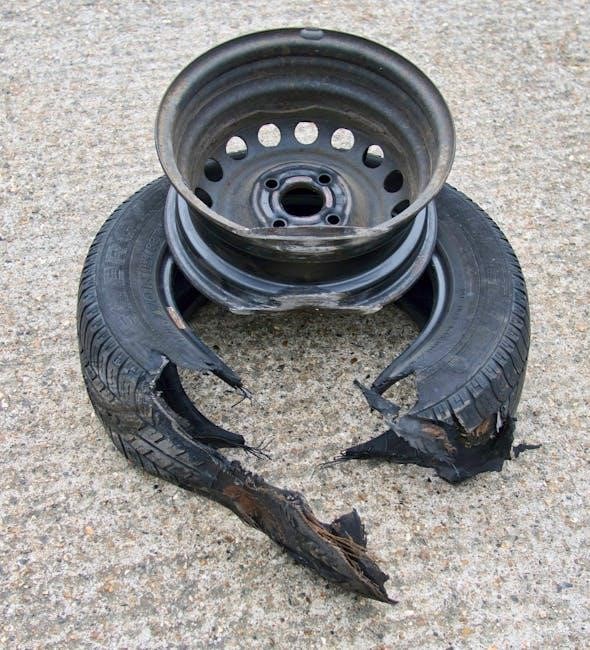A Lost Wages Form is a document used to detail income loss after a car accident‚ crucial for insurance claims and legal processes․ It helps victims seek compensation for missed workdays‚ ensuring fair reimbursement for financial impact․
What is a Lost Wages Form?
A Lost Wages Form is an official document used to detail the income lost by an individual due to an inability to work following a car accident․ It typically includes information such as the claimant’s earnings‚ hours missed‚ and the duration of absence from work․ The form often requires verification from the employer to confirm the lost wages and may also include calculations for overtime‚ tips‚ or commissions․ This document is essential for insurance claims and legal processes‚ serving as proof of economic losses resulting from the accident․ Accurately completing the form ensures victims can seek fair compensation for their financial hardships․
Importance of Documenting Lost Wages After a Car Accident
Documenting lost wages after a car accident is crucial for securing fair compensation․ It provides concrete evidence of income loss‚ enabling victims to claim damages for missed workdays․ This documentation supports insurance claims and legal proceedings‚ ensuring victims are reimbursed for financial hardships․ Accurate records‚ such as pay stubs and employer verification‚ strengthen the claim․ Without proper documentation‚ proving wage loss becomes challenging‚ potentially reducing the compensation amount․ Timely and detailed recording of lost wages helps victims recover financially and regain stability after an accident․ It is a vital step in the recovery process‚ ensuring justice and financial restitution for the losses incurred․
Understanding Lost Wages in Car Accident Claims
Lost wages represent income lost due to accident-related injuries‚ impacting a victim’s ability to earn․ They are a critical component of car accident claims‚ ensuring compensation for financial losses incurred․
Defining Lost Wages and Their Impact on Victims
Lost wages refer to the income a victim cannot earn due to injuries from a car accident․ This includes missed pay‚ overtime‚ tips‚ and commissions․ The impact is significant‚ causing financial strain and affecting the victim’s ability to cover living expenses‚ medical bills‚ and support dependents․ Lost wages also extend to future earning potential if injuries result in long-term or permanent disabilities․ Documenting these losses through a Lost Wages Form is essential for seeking fair compensation and ensuring victims can recover financially․
Types of Lost Wages: Past‚ Present‚ and Future Earnings
Lost wages are categorized into past‚ present‚ and future earnings․ Past wages account for income missed from the accident date until recovery․ Present wages cover ongoing losses during recovery․ Future wages address long-term earning capacity due to permanent disabilities․ Each type requires detailed documentation‚ including pay stubs and medical records‚ to accurately calculate compensation․ This classification ensures victims receive comprehensive reimbursement‚ addressing both immediate and long-term financial impacts․ Understanding these categories is crucial for accurately completing a Lost Wages Form and securing fair compensation․
How Lost Wages Differ from Other Damages in Car Accident Claims

Lost wages are distinct from other damages in car accident claims as they focus on income loss due to inability to work․ Unlike medical expenses or property damage‚ lost wages are purely economic‚ requiring proof of earnings before and after the accident․ They are calculated based on documented income‚ such as pay stubs and employer statements․ This differs from non-economic damages like pain and suffering‚ which are subjective․ Lost wages are also unique in requiring verification from employers and‚ in some cases‚ medical professionals․ This specificity makes them a critical yet complex component of a claim‚ ensuring victims are reimbursed for lost earning capacity․
The Process of Completing a Lost Wages Form
Completing a Lost Wages Form involves gathering payroll records‚ detailing work absences‚ and calculating income loss․ Accuracy and employer verification are crucial for a valid claim submission․
Gathering Necessary Information for the Form

To complete a Lost Wages Form‚ you must gather essential documents‚ such as recent pay stubs‚ tax returns‚ and an official statement from your employer․ These records help verify your income and the duration of your work absence due to the accident․ Additionally‚ medical records confirming your inability to work are crucial․ Accurate details about your job title‚ hourly rate‚ and the total days missed are also required․ Organizing this information ensures your claim is processed efficiently and fairly‚ providing a clear picture of your financial losses for compensation purposes․
Steps to Fill Out the Lost Wages Form Accurately
Begin by obtaining the correct Lost Wages Form from your insurance provider or legal advisor․
Fill in your personal and accident details‚ including the date and location of the incident․
Attach supporting documents like recent pay stubs‚ tax returns‚ and a formal statement from your employer․
Clearly state the number of workdays missed and the total wages lost due to the accident․
Include any additional income‚ such as overtime or commissions‚ that you would have earned․
Ensure your employer verifies the information and signs the form․
Double-check all details for accuracy before submitting to avoid delays in processing your claim․
Common Mistakes to Avoid When Completing the Form
When filling out a Lost Wages Form‚ avoid errors that could delay or deny your claim․
– Ensure accuracy in reporting missed workdays and wages․
– Include all income types‚ such as overtime or commissions‚ to avoid underestimating losses․
– Do not miscalculate wages; use precise figures based on pay stubs and tax returns․
– Obtain employer verification to validate lost wages claims․
– Avoid missing deadlines for submitting the form and supporting documents․
– Do not overlook including a doctor’s note if injuries prevented work․
– Keep a copy of the completed form and all documentation for your records․
These mistakes can lead to claim denials‚ so attention to detail is crucial․
Employer’s Role in Lost Wages Claims

Employers must verify and document an employee’s lost wages due to an accident‚ providing accurate wage information and confirming work-related absence for insurance claims․
What Employers Need to Provide for Lost Wages Claims
Employers must provide detailed documentation to verify an employee’s lost wages due to a car accident․ This includes the employee’s wage rate‚ total hours missed‚ and the exact duration of absence; They should also specify whether the lost wages include overtime or other compensation․ Employers are required to calculate the total wages lost‚ including any sick leave or vacation time used because of the accident․ The documentation must be signed and dated‚ confirming its accuracy․ This information is crucial for processing the claim and ensuring the employee receives fair compensation for their financial loss․
How Employers Verify Lost Wages Due to an Accident
Employers verify lost wages by providing detailed records of an employee’s earnings before and after the accident․ They calculate the total hours missed‚ including regular pay‚ overtime‚ and any additional compensation․ The employer must document the employee’s wage rate‚ the duration of absence‚ and confirm whether the absence was directly due to the accident․ This information is typically provided on a Lost Wages Form‚ which includes the employer’s signature and date․ The form ensures the accuracy of the claim and helps insurance companies process the request for compensation․ Employers must also specify if the lost wages include sick leave or vacation time used during recovery․
Legal Obligations of Employers in Supporting Lost Wages Claims
Employers are legally required to provide accurate documentation to support lost wages claims after a car accident․ They must complete and sign the Lost Wages Form‚ detailing the employee’s earnings‚ hours missed‚ and wage rate․ Employers must verify the absence was directly due to the accident and confirm the total lost wages‚ including overtime or benefits․ They are also obligated to submit the form within the required timeframe‚ ensuring compliance with state-specific laws‚ such as Florida’s Personal Injury Protection (PIP) regulations․ Failure to provide truthful and timely documentation may delay or jeopardize the claim‚ underscoring the importance of employer cooperation in the process․

Legal Considerations for Lost Wages Claims
Understanding legal rights and timelines is crucial for lost wages claims․ Adhering to the statute of limitations and state-specific laws ensures eligibility for compensation and avoids delays․
Statute of Limitations for Filing Lost Wages Claims
The statute of limitations sets a deadline for filing lost wages claims after a car accident․ Typically‚ this period varies by state‚ ranging from two to four years․ In Florida‚ for example‚ claimants have four years from the accident date to file‚ while other states may allow two or three years․ Missing this deadline can bar the claim entirely․ The clock usually starts from the date of the accident‚ not from when injuries or wage loss becomes apparent․ Understanding and adhering to this timeline is crucial to ensure eligibility for compensation․ Acting promptly and consulting an attorney can help navigate these legal requirements effectively․
State-Specific Laws Regarding Lost Wages Compensation
State-specific laws play a significant role in determining lost wages compensation after a car accident․ For example‚ Florida requires Personal Injury Protection (PIP) coverage‚ which includes lost wages‚ while Michigan has specific forms for self-employed individuals․ Louisiana mandates detailed documentation for lost earnings claims․ Each state’s laws outline eligibility‚ calculation methods‚ and filing processes․ Understanding these variations is crucial for ensuring compliance and maximizing compensation․ For instance‚ some states cap lost wage recovery‚ while others allow reimbursement for future earnings․ Consulting local legal resources or an attorney is essential to navigate these differences effectively and avoid missing critical deadlines or requirements․ State laws also dictate how lost wages are verified and calculated‚ making them a cornerstone of successful claims․
Role of Insurance Companies in Processing Lost Wages Claims
Insurance companies play a pivotal role in processing lost wages claims after a car accident․ They typically require a completed Lost Wages Form‚ medical records‚ and employer verification to assess the claim’s validity․ Insurers review the documentation to determine the extent of wage loss and ensure compliance with policy terms․ They may also investigate discrepancies or require additional evidence․ Once approved‚ compensation is disbursed according to the policy’s coverage limits and state-specific regulations․ However‚ denials can occur if forms are incomplete or deadlines are missed‚ emphasizing the importance of accurate submissions․ Effective communication with the insurance company is key to a smooth claims process and fair compensation for lost wages․
Special Cases in Lost Wages Claims
Certain individuals face unique challenges in lost wages claims after a car accident‚ such as self-employed workers‚ part-time employees‚ and those with pre-existing medical conditions․
Lost Wages for Self-Employed Individuals After a Car Accident
Self-employed individuals face unique challenges when seeking compensation for lost wages after a car accident․ Unlike traditional employees‚ they must provide detailed financial records to prove income loss․ This includes tax returns‚ invoices‚ and profit-and-loss statements․ Without a structured pay stub‚ demonstrating lost earnings can be complex․ Insurance companies often scrutinize self-employed claims more closely‚ requiring thorough documentation to verify reduced income due to the accident․ Properly completing a lost wages form with accurate financial data is crucial for self-employed individuals to secure fair compensation for their lost earning capacity during recovery․
Calculating Lost Wages for Part-Time or Seasonal Workers
For part-time or seasonal workers‚ calculating lost wages after a car accident requires careful documentation․ Since their income may vary‚ it’s essential to provide recent pay stubs‚ work schedules‚ and a record of average earnings․ Employers must verify the number of missed hours or days directly attributable to the accident․ Seasonal workers may need to project expected earnings based on previous years’ income․ Insurance companies often review these claims meticulously‚ so accurate and detailed records are crucial to ensure fair compensation for lost wages․ Proper documentation helps establish a clear link between the accident and income loss‚ supporting the claim effectively․
Lost Wages for Victims with Pre-Existing Medical Conditions
Victims with pre-existing medical conditions face unique challenges when claiming lost wages after a car accident․ Insurance companies may dispute whether the accident directly caused the inability to work‚ complicating the process․ Detailed medical records and expert testimony are often required to establish a clear link between the accident and the inability to earn․ Part-time or seasonal workers with pre-existing conditions may need to provide additional documentation‚ such as average earnings and work history‚ to support their claims․ Legal assistance is highly recommended to navigate these complexities and ensure fair compensation for lost wages․ Proper documentation is key to a successful claim․

Supporting Documentation for Lost Wages Claims

Medical records‚ pay stubs‚ tax returns‚ and a doctor’s note are essential to verify lost wages․ These documents help establish the legitimacy of your claim and calculate fair compensation․
Importance of Medical Records in Lost Wages Claims

Medical records are crucial in lost wages claims as they provide direct evidence linking the accident to injuries․ These documents detail the extent of treatment‚ recovery time‚ and any ongoing medical needs‚ which are essential for calculating lost income․ By verifying the severity of injuries‚ medical records help prevent disputes over the validity of wage loss claims․ They also establish a clear connection between the accident and the inability to work‚ ensuring fair compensation for victims․ Accurate and detailed medical records strengthen the credibility of a claim‚ making them indispensable for resolving lost wages cases effectively․
Role of Pay Stubs and Tax Returns in Verifying Lost Wages
Pay stubs and tax returns are essential for verifying lost wages‚ providing concrete evidence of a claimant’s income before and after the accident․ Pay stubs detail regular earnings‚ overtime‚ and deductions‚ while tax returns offer a comprehensive view of annual income․ These documents help calculate the exact financial loss‚ ensuring accurate compensation․ By comparing pre- and post-accident earnings‚ they validate the extent of wage loss․ Tax returns also confirm self-employment income‚ crucial for individuals without traditional pay stubs․ Together‚ they serve as reliable proof‚ strengthening the legitimacy of lost wages claims and facilitating fair settlement determinations for victims seeking rightful compensation․
How to Use a Doctor’s Note to Support Lost Wages Claims
A doctor’s note is a critical document to support lost wages claims‚ as it provides medical evidence of injuries sustained in the accident․ The note should detail the nature of the injuries‚ treatment duration‚ and any work restrictions or time missed due to recovery․ This documentation helps establish a direct link between the accident and the inability to work‚ validating the lost wages claim․ Insurance companies often require this note to verify the legitimacy of the claim and calculate fair compensation․ By including specific details about the medical condition and its impact on employment‚ a doctor’s note strengthens the case for rightful reimbursement of lost income․

Submitting the Lost Wages Form

Complete the form accurately‚ obtain your employer’s signature‚ and submit it to the insurance company․ Ensure all details are correct to avoid processing delays and ensure timely reimbursement․
Where and How to Submit the Completed Form
Once completed‚ the Lost Wages Form should be submitted to the insurance company handling your claim․ Print the form‚ fill in the current date‚ your name‚ the accident date‚ and your claim number․ Provide the form to your employer for their signature and details about your lost wages․ After your employer completes their section‚ submit the form to the insurance company via mail‚ email‚ or fax‚ as specified in their guidelines․ Keep a copy for your records and follow up to confirm receipt․ Timely submission ensures your claim is processed efficiently and reimbursement is issued without delays․
Following Up on Your Lost Wages Claim
After submitting your Lost Wages Form‚ it’s essential to follow up with the insurance company to ensure your claim is being processed․ Contact them via phone or email to confirm receipt of your form and inquire about the status․ Provide your claim number for reference․ Regular follow-ups demonstrate your commitment to resolving the matter promptly․ Keep detailed records of all communications‚ including dates‚ names‚ and summaries of conversations․ If delays occur‚ politely request clarification and timelines․ Consistent follow-up helps prevent misunderstandings and ensures your claim progresses efficiently․ If issues persist‚ consider consulting a legal professional to assist in resolving the matter․
What to Expect After Submitting the Form
After submitting your Lost Wages Form‚ the insurance company will review your claim to verify the details and documentation provided․ This process may take several weeks‚ depending on the complexity of your case․ You may receive requests for additional information or clarification․ Once approved‚ you will receive compensation for the lost wages as calculated․ If denied‚ you will be informed of the reasons‚ and you may have the option to appeal the decision․ Keep track of all correspondence and follow up periodically to ensure your claim is being processed․ Understanding the timeline and potential outcomes helps you prepare for the next steps in your case․
The Lost Wages Form is a crucial document for seeking compensation after a car accident․ It ensures fair reimbursement for income lost due to injuries‚ helping victims recover financially and move forward․
Key Takeaways for Filing a Lost Wages Claim
When filing a lost wages claim‚ ensure accurate documentation of income loss due to a car accident․ Obtain a lost wages form from your employer or insurance provider and fill it thoroughly․ Include details like missed workdays‚ hourly rates‚ and any overtime or tips․ Attach supporting documents such as pay stubs‚ medical records‚ and a doctor’s note to validate your claim․ Be aware of the statute of limitations and submit the form promptly to avoid delays․ For self-employed individuals‚ provide tax returns or financial statements to prove income loss․ Seek legal assistance if disputes arise‚ as insurance companies may scrutinize claims closely․ Professional guidance can help navigate complex processes and ensure fair compensation․
Importance of Seeking Professional Help for Lost Wages Claims
Seeking professional help is crucial when filing a lost wages claim after a car accident․ Legal experts or insurance specialists can guide you through complex processes‚ ensuring compliance with state-specific laws and deadlines․ They can help calculate accurate income loss‚ including overtime and future earnings‚ and gather necessary documentation like medical records and employer statements․ Professionals also negotiate with insurance companies to maximize compensation and avoid claim denials․ For self-employed individuals or those with pre-existing conditions‚ expert assistance is particularly valuable in addressing unique challenges; Their expertise ensures your rights are protected and your claim is presented effectively‚ minimizing delays and disputes․